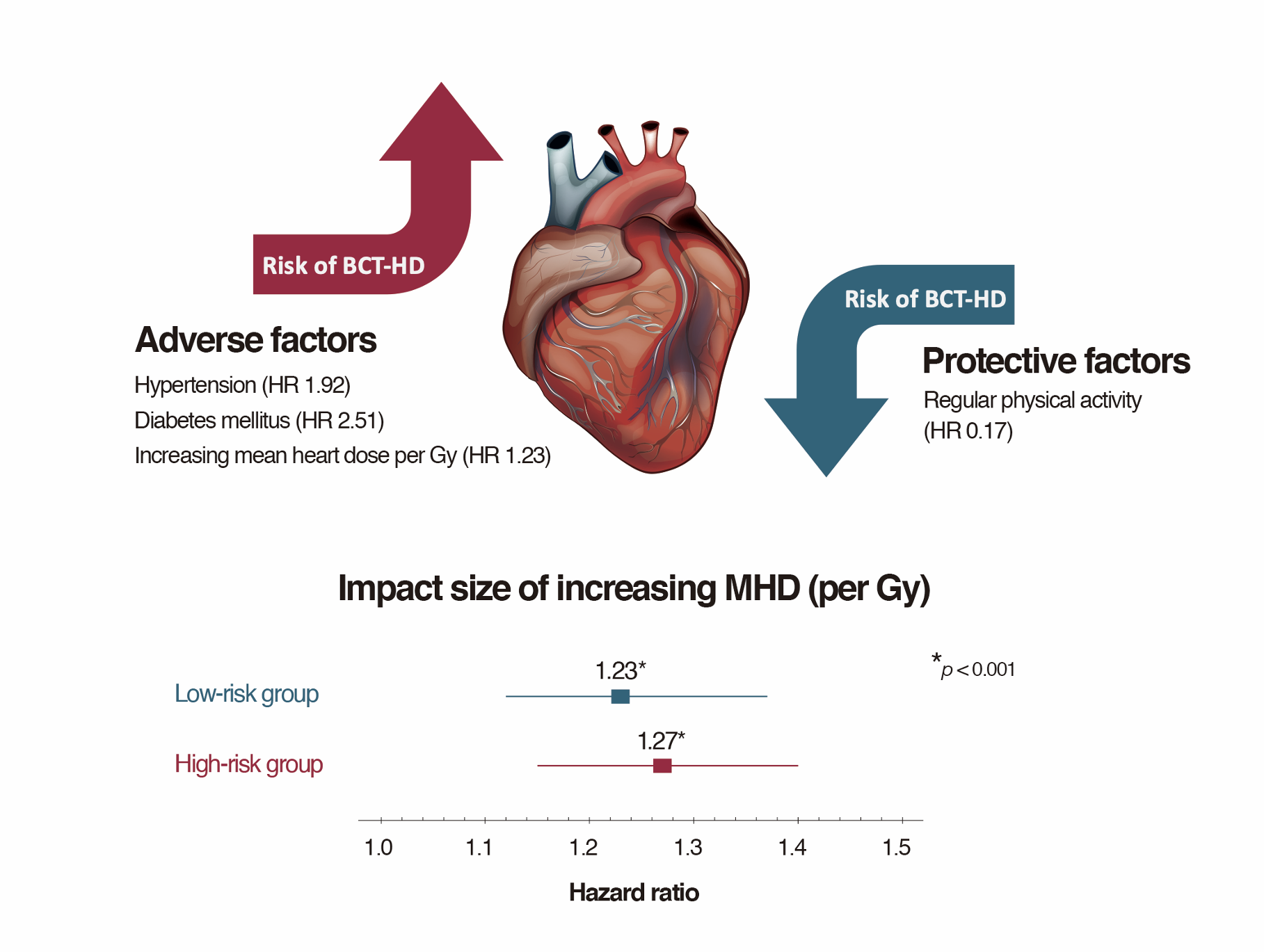글로벌 연구동향
방사선종양학
- 2021년 08월호
[Int J Radiat Oncol Biol Phys.] Risk of Cardiac Disease in Patients With Breast Cancer: Impact of Patient-Specific Factors and Individual Heart Dose From Three-Dimensional Radiation Therapy Planning연세의대 / 정승연, 장지석*, 김용배*
- 출처
- Int J Radiat Oncol Biol Phys.
- 등재일
- 2021 Jun 1
- 저널이슈번호
- 110(2):473-481. doi: 10.1016/j.ijrobp.2020.12.053.
- 내용
Abstract
Purpose: This retrospective cohort study aimed to determine whether adjuvant radiation therapy increases the risk of cardiac toxicity in Asian women with breast cancer, with a focus on patient-specific factors.Methods and materials: We evaluated women who underwent primary breast surgery for breast cancer with (n = 520) or without (n = 774) adjuvant radiation therapy between January 2005 and May 2013. Patients who underwent breast surgery without radiation therapy were categorized as patients who received 0 Gy to the heart. The primary endpoint was the occurrence of a breast cancer treatment-related heart disease (BCT-HD), defined as a diagnosis of angina pectoris, unstable angina, myocardial infarction, ischemic heart disease, heart failure, or atrial fibrillation.
Results: In total, 1294 patients were included. The overall 5- and 10-year BCT-HD rates were 2.4% and 5.7%, respectively. The risk of an BCT-HD significantly increased per 1-Gy increase in the mean heart dose (adjusted hazard ratio: 1.23). Additionally, histories of hypertension (hazard ratio: 1.92), and diabetes (hazard ratio: 2.51) were found to be adverse risk factors, whereas regular physical exercise (hazard ratio: 0.17) was a protective factor. Subgroup analysis according to risk groups showed that the effect of increasing mean heart dose (per Gy) was similar between women without or with minimal risk factors (hazard ratio: 1.23) and women with multiple risk factors (hazard ratio: 1.27).
Conclusions: The results indicate a radiation dose-effect relationship for cardiac disease in breast cancer patients, highlighting that there remains a considerable risk of cardiac toxicity even with 3-dimensional radiation therapy planning. Thus, measures to minimize the heart dose in breast cancer patients undergoing adjuvant radiation therapy, even in those without any risk factor for cardiac disease, should be routinely implemented.

Affiliations
Seung Yeun Chung 1 , Jaewon Oh 2 , Jee Suk Chang 3 , Jaeyong Shin 4 , Kyung Hwan Kim 5 , Kyeong-Hyeon Chun 2 , Ki Chang Keum 5 , Chang-Ok Suh 6 , Seok-Min Kang 2 , Yong Bae Kim 5
1 Department of Radiation Oncology, Yonsei University College of Medicine, Seoul, South Korea; Department of Radiation Oncology, Ajou University School of Medicine, Suwon, South Korea.
2 Cardiology Division, Severance Cardiovascular Hospital and Cardiovascular Research Institute, Yonsei University College of Medicine, Seoul, South Korea.
3 Department of Radiation Oncology, Yonsei University College of Medicine, Seoul, South Korea. Electronic address: changjeesuk@yuhs.ac.
4 Department of Preventive Medicine, Yonsei University College of Medicine, Seoul, South Korea.
5 Department of Radiation Oncology, Yonsei University College of Medicine, Seoul, South Korea.
6 Department of Radiation Oncology, Yonsei University College of Medicine, Seoul, South Korea; Department of Radiation Oncology, CHA Bundang Medical Center, CHA University, Seongnam-si, Gyeonggi-do, South Korea.
- 연구소개
- 유방암에서 방사선 치료는 국소재발율을 감소 시킴으로써 생존율을 올리는 중요한 치료입니다. 하지만 방사선 치료 중 일부의 방사선이 심장에 노출 될 수 있고, 이는 장기적으로 심장독성을 일으킬 수 있습니다. 본 연구에서는 1294명의 유방암 환자를 대상으로 방사선 치료 계획상 심장에 들어간 선량을 환자 별로 계산하고, 환자의 운동과 관련된 정보를 포함한 위험인자를 조사하여 심장 선량과 심장병의 선량-반응 관계를 보고자 하였습니다. 분석 결과 유방암 치료 후 심장 질병은 환자의 심장에 들어간 방사선량이 많아질수록 유의미하게 증가하였습니다 (1Gy 증가당 상대 위험도 23% 증가). 또한 고혈압과 당뇨의 과거력이 있는 경우 이러한 위험도는 더 증가하였으며, 반대로 규칙적인 운동을 하는 경우 그렇지 않은 환자보다 심장병의 위험도가 낮아지는 것을 확인하였습니다. 이전 연구 결과는 심장병의 유병률과 흡연율이 높은 서양에서 발표되었던 반면, 본 연구는 서양 외 국가에서 보고된 첫 선량-반응 연구로써 인종과 동반 질환 유무와 상관없이 모든 유방암 환자에서 수술 후 방사선 치료 시 심장 선량을 최소화하는 치료 방법을 도입해야 됨을 시사하였습니다.
- 덧글달기








편집위원
유방암 방사선치료 후 심장질환의 위험성을 분석한 논문으로, 평균심장선량 1 Gy 당 위험도가 23% 상승하며, 고혈압과 당뇨는 위험도를 올리고 규칙적인 운동이 위험도를 낮추어줌.
덧글달기닫기2021-07-27 14:31:52
등록
편집위원2
유방암에 대한 방사선치료시 mean heart dose와 치료 후 heart disease의 연관성을 보여주는 연구로, 유방암 치료시 heart에 조사되는 선량을 최소화하기위한 근거를 제시합니다.
덧글달기닫기2021-07-27 14:35:34
등록